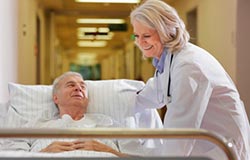Upper GI Endoscopy Services
Upper GI Endoscopy Services Overview
 Symptoms such as trouble swallowing, abdominal pain, nausea or vomiting can indicate a problem in your digestive tract. An upper gastrointestinal (GI) endoscopy allows your physician to view and treat potential concerns in your esophagus, stomach and the first part of your small intestine. If your physician recommends an upper GI endoscopic procedure for you, Northwestern Medicine offers advanced endoscopy services provided by caring, skilled specialists*.
Symptoms such as trouble swallowing, abdominal pain, nausea or vomiting can indicate a problem in your digestive tract. An upper gastrointestinal (GI) endoscopy allows your physician to view and treat potential concerns in your esophagus, stomach and the first part of your small intestine. If your physician recommends an upper GI endoscopic procedure for you, Northwestern Medicine offers advanced endoscopy services provided by caring, skilled specialists*.
Your upper GI endoscopy experience
If your physician is concerned about your digestive health, rest assured that the skilled and caring teams at Northwestern Medicine make your endoscopy experience safe, effective and as pleasant as possible. These board-certified gastroenterology physicians, specially trained nurses and other technicians are experienced in the latest upper GI endoscopy procedures—and at minimizing your discomfort.
Spacious suites feature the latest technology and equipment, and personal preparation and recovery bays offer a private retreat.
Upper GI endoscopy procedures
During an upper GI endoscopy procedure, a thin, lighted tube—called an endoscope—is inserted into your body through your mouth. A camera at the end of this tube transmits images, allowing the physician to examine your esophagus, stomach and the first part of your small intestine, which is called the duodenum.
During the procedure, your physician looks closely for any problems that require evaluation, diagnosis or treatment. Sometimes, your physician may take a sample of tissue, called a biopsy, which is later tested.
A therapeutic treatment may be performed to remove abnormal tissue or treat a disease. The entire endoscopy procedure is relatively quick, usually taking just 10 to 20 minutes to perform.
Northwestern Medicine offers a range of specialized upper GI endoscopic procedures and treatments. If you are concerned about a digestive health issue, talk to your physician about upper GI endoscopy services at Northwestern Medicine.
Conditions diagnosed through upper GI endoscopy
Typically, your physician orders an upper GI endoscopy in response to symptoms you are experiencing. The procedure provides important information to help diagnose and treat a variety of conditions, including:
- Barrett esophagus
- Bleeding
- Cancer
- Gastroesophageal reflux disease (GERD)
- Hiatal hernia
- Inflammation
- Obstructions
- Polyps or other abnormal growths
- Precancerous conditions
- Tumors
- Ulcers

